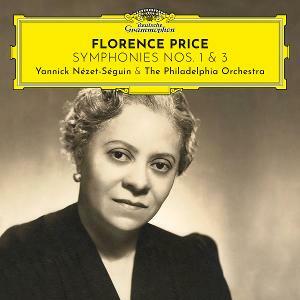New York, NY (Top40 Charts) Florence Price came to prominence almost ninety years ago, having surmounted systemic barriers to the progress of African-Americans and women in classical music. Much of her music then fell into neglect, however, and has only recently been rediscovered. Among those championing her work today are The Philadelphia Orchestra and its
Music Director, Yannick Nézet-Séguin. Their latest Deutsche Grammophon recording, Florence Price · Symphonies Nos. 1 & 3, will be released as an e-album on 24
September 2021, launching a planned series of recordings celebrating the achievements of the first African-American woman to have a work performed by a major American orchestra.
"We're delighted to record the music of Florence Price for Deutsche Grammophon," comments Nézet-Séguin. "So much important music around the world has been neglected, not because of the quality of the work, but for superficial reasons. It's so important to me and to The Philadelphia Orchestra to look at these works, bring back the music of composers we believe in, like Florence Price, and continue broadening the repertoire to give a much more diverse representation of who we are as a society today."
Born in
Little Rock, Arkansas, in 1885, Florence Price received instruction in music from her mother and went on to study composition at the New England Conservatory in
Boston and privately with its director
George Whitefield Chadwick. After her marriage, she and her family moved to
Chicago to escape the racial conflicts of the south. She then divorced her abusive husband and focused on bringing up her children, supporting the family by working as a pianist, organist, teacher and composer.
Her Symphony No. 1 in E minor (1931-32), winner of the Rodman Wanamaker Contest in Musical Composition, was first performed in 1933 by Frederick Stock and the
Chicago Symphony Orchestra. Stock's support encouraged Price to create other large-scale works. Her Third Symphony, originally commissioned by the Federal
Music Project during the Great Depression, was first performed in 1940.
Notes Nezet-Seguin, "In her First Symphony, we hear folkloric melodies blended with church music chords, and chords that are opening up to jazz, to create something that sounds quintessentially American. She was adapting a European form and putting it into her own language … In the Third Symphony, every melody feels as if it should be sung … The material is so vocal, the writing is almost choral. And I love the fact that the orchestration encourages solos from everywhere in the orchestra … It feels as if she loved all the instruments equally."
Although Price continued to compose and teach until her death in 1953, her music was routinely dismissed as conservative by ultra-modernists. Meanwhile, doors that might otherwise have opened remained firmly shut thanks to racism and sexism. She continued to be cited as one of the earliest African-American composers to achieve nationwide acclaim in the US, but performances, publications and recordings of her work remained rare.
Happily, a revival is now underway. Price's First and Third Symphonies were issued in an impressive scholarly edition in 2008. The following year a batch of manuscript scores, long believed to have been lost, were discovered by the new owners of the composer's former summer home in St Anne, Illinois. In exploring her music, on stage and in the studio, Yannick Nézet-Séguin and The Philadelphia Orchestra aim to help restore Price to her rightful place among other leading twentieth-century American composers.
The conductor sums up this desire with reference to the Third Symphony: "I hope when we play it … and as other orchestras play it, one day - and hopefully sooner rather than later - it will become as familiar and as much part of the canon and part of who we are as an orchestra as any other symphony by Tchaikovsky or Rachmaninoff."
























